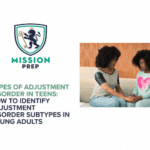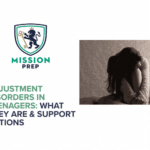Adjustment Disorder Treatment for Teens: Therapy Options

Teens often face emotional pressures from different aspects of life; academic success, social media, and family changes can all add to the weight of this period of development. Not to mention the added duress of significant transitions such as divorce or the loss of a loved one.
When life’s challenges become too much, they can trigger an adjustment disorder in teens – a condition that causes emotional and behavioral changes in response to stress.
As a parent, it can sometimes be hard to tell whether your teen is managing the pressure or needs some extra support. Fortunately, there is effective treatment for adjustment disorder teens that can greatly improve their symptoms.
If you’re concerned that your teen has an adjustment disorder, support from a mental health professional can guide your family through the best treatment options for your child’s needs. This article also works as a useful tool for understanding treatment for adjustment disorder in teens, as it walks you through:
- What adjustment disorder is
- When professional help may be needed
- Effective treatment options for teens with adjustment disorder
- How to choose the best treatment for your teen
- Where to find professional support

Key Takeaways
- Adjustment disorder treatment for teens focuses on reducing emotional and behavioral distress caused by stressful life changes.
- Cognitive Behavioral Therapy (CBT) is a leading option for helping teens develop coping tools and reframe negative thinking patterns.
- Family therapy enhances teen treatment by improving home communication, boundaries, and support during recovery.
- Group therapy offers social skill-building and emotional validation among peers facing similar adjustment issues.
- Medication may be included in treatment for teens with intense symptoms but is typically used alongside talk therapy, not as a replacement.
Table of Contents
Understanding Adjustment Disorder in Teens
It’s natural to react in some way when big life changes happen. However, an adjustment disorder is much more than a normal reaction to stress and change. Instead, it’s an excessive or unhealthy response that develops within three months of the event happening and often lasts up to six months. However, there are cases where adjustment disorder becomes chronic, lasting for much longer and causing a teen greater distress.2
It’s good to note that adjustment disorders are fairly common in children and adolescents because of the many changes they go through in these vital developmental periods. In fact, it’s estimated that up to 35% of people in general experience an adjustment disorder.1
However, due to the risk of symptoms worsening with time, early intervention is often key for improving outcomes. Recognizing the following signs may help you access timely treatment.
Signs of Adjustment Disorders in Adolescents
Adjustment disorders are divided into six types according to the Diagnostic and Statistical Manual of Mental Disorders (DSM-5), grouped together by their main symptoms. The six types are:3
Adjustment disorder with depressed mood- Adjustment disorder with anxiety
- Adjustment disorder with anxiety and depressed mood
- Adjustment disorder with disturbance of conduct
- Adjustment disorder with mixed disturbance of emotions and conduct
- Adjustment disorder unspecified
Symptoms of adjustment disorders in teenagers typically present as behavioral changes. This may look like acting rebelliously or defiantly, fighting, impulsivity, or skipping school. However, physical and emotional symptoms can also occur. Some of the main physical symptoms are headaches, heart palpitations, exhaustion, or unexplained aches and pains, while a teen may emotionally feel hopeless, depressed, anxious, or agitated.2,4
These symptoms could ultimately lead to teens taking risks they normally wouldn’t take, a decline in academic performance, problems with family and friends, social isolation, and struggles with overall well-being.
If you are concerned that your teen may be living with an adjustment disorder, it’s important to know when to reach out for professional support. The next section may guide you through this process.
When to Seek Professional Help for an Adjustment Disorder
Often, symptoms of adjustment disorder in teens appear within three months of a stressful event and improve over time. However, they don’t always get better without the right support. Getting support early on can contribute to a quicker recovery and also prevent their symptoms from getting worse over time.
Being able to recognize early warning signs can enable you to seek the professional help adjustment disorder teens need. Specifically, your teen may require professional support if their symptoms are:
Thankfully, effective treatment is available for adjustment disorder. The following sections cover the main treatment options for teens, as well as other options to support their recovery and well-being.
Please note that if your teen is having thoughts of suicide or self-harm, it’s essential to seek immediate help, such as calling 911 or going to your nearest emergency department.
Therapy for Adjustment Disorder Adolescents
The primary treatment for adjustment disorder in teens is psychotherapy, otherwise known as “talk therapy.” Therapy allows teens to access emotional support and discover why they have reacted the way they did. Plus, in sessions, they can also learn new ways to manage stress and their emotions, reducing the risk of a relapse of symptoms.
Some of the different therapeutic options and settings available for teens with adjustment disorder are explored below.
CBT for Adjustment Disorder Youth
Cognitive behavioral therapy (CBT) is a common type of psychotherapy adjustment disorder youth are recommended for treatment. Research suggests that CBT is often appropriate for many teens as it can improve symptoms such as anxiety, depression, worry, and stress.5,6CBT is a structured form of therapy that focuses on changing unhelpful thoughts, feelings, and behaviors. With this form of counseling for adjustment disorder teenagers can learn age-appropriate skills around problem-solving, communication, anger management, and stress management.7
School Counseling for Teens
School counselors are well-positioned to help teens with the challenges they encounter at school. For instance, they can either directly help teens manage school-related stressors or work with staff to create a supportive environment for them to learn in.Additionally, school counselors can provide short-term individual and group counseling to help teens develop coping skills. They may also collaborate with parents, students, and outside healthcare providers to develop a smooth treatment plan.8 Therefore, through school counseling adjustment disorder teenagers can access the support they need to both manage their condition at school and continue progressing academically.
Peer Group Therapy
Research confirms group therapy to be effective at improving symptoms of adjustment disorder, such as depression and anxiety, along with improving physical and emotional health.9These benefits often come from how peer group therapy adjustment disorder adolescents can develop their social and interpersonal skills in a supportive environment. This form of therapy can also help reduce feelings of isolation by allowing teens to connect with others who face similar struggles.
Although therapy is the main treatment for adjustment disorders, other options may support your teen’s recovery, such as family interventions, holistic care, and medications. We’ll dive into these options in the following sections.
Family-Based Interventions for Adjustment Disorder
Some suggestions for creating a supportive family environment with less stress include:
Family therapy: The family therapy adjustment disorder teens truly benefit from engaged members of the family together to focus on resolving conflicts and improving communication. This may be especially effective if the trigger for the adjustment disorder was related to a family change or event.
- Open and honest communication: Encourage your teen to open up about what they are going through. When they do, acknowledge their feelings and let them know that you are there to support them.
- Supportive feedback: Aim to support your teen by praising their efforts and positive behavior. If critical feedback is needed, try to make sure it’s constructive and let them know you value their efforts more than the outcomes.
- Fun and healthy activities: Encourage fun activities that can be carried out together, for example, exercise classes, cooking meals, or arts and crafts.
- Provide practical and emotional support: Help your teen to keep a healthy lifestyle where possible, such as eating a balanced diet, exercising, and getting enough sleep. Providing practical support may also include helping them to attend appointments with their therapist or working with the school to improve circumstances for them.
Holistic Therapies Adjustment Disorder Adolescents May Benefit From
Holistic approaches for supporting recovery from adjustment disorder in teens focus on healing the whole person – body, mind, and spirit. As such, this approach encourages teens to make healthy, positive lifestyle changes that contribute to improving mental and physical well-being.
The following are examples of how holistic approaches may be used to help your teen.
Mind-Body Practices
Mind-body practices are, perhaps unsurprisingly, designed to improve the connection between the mind and body. These techniques can reduce stress and improve a teen’s ability to regulate their emotions.
Some examples of mind-body practices that teens could try include:
Mindful breathing: Mindfulness can help reduce symptoms of stress, anxiety, and depression, as well as boost concentration and focus.11- Grounding exercises: Relaxation strategies such as grounding can help reduce the symptoms of anxiety and panic by allowing the teen to be present in the moment and their environment.12
- Yoga and meditation: Yoga typically combines physical movement with breathing techniques, meditation, and relaxation – helping to improve emotional regulation. Moreover, research suggests that using both meditation and yoga in a regular routine can be an effective approach for managing stress.13
- Gratitude journaling: The process of journaling can bring many benefits, such as lowering stress levels, reducing symptoms of anxiety and depression, and building better self-awareness.14
Lifestyle and Physical Health Routines
Research shows that there is a strong link between our physical and mental health. Therefore, simple lifestyle changes may help to improve our inner emotional landscape.
Some evidence-backed ways of implementing these changes include:
Healthy eating: Studies have found that eating a healthy, balanced diet can reduce symptoms of depression and improve overall well-being. The opposite is also found to be true; eating a diet high in sugars, for example, can worsen symptoms of mood disorders.15- Regular physical activity: Exercise can act like a natural mood-booster and stress-buster, reducing the levels of stress hormones in the body and increasing endorphins – the feel-good chemicals.16,17
- Getting enough quality sleep: Good quality sleep helps your brain to work at its best, whereas having poor sleep may cause teens to struggle with emotional regulation and feel more stressed.18 Sleep routines may help a teen relax before bed and improve the quality of their rest.
Social and Emotional Support
As mentioned earlier, social and emotional support is often of great importance when managing mental health conditions. These forms of support help us to manage stress, build up our resilience, and continue to feel connected to others at a time when we may otherwise feel isolated. Therefore, creating a daily routine that involves interacting with others, maintaining friendships, and bringing in new support, such as therapy, can be invaluable for supporting recovery from an adjustment disorder.
Medication for Adjustment Disorder Teens
If your teen experiences depression, anxiety, or sleep issues as part of adjustment disorder, their healthcare professional may prescribe medication to help ease these symptoms – if they feel it is appropriate.
For instance, antidepressants or anti-anxiety medications may be prescribed to ease symptoms of depression or anxiety. Alternatively, a teen may be recommended a sleep aid to help with insomnia.
However, although medications may improve certain symptoms, they do not address the root causes of adjustment disorder, which is why they are not prescribed as a stand-alone treatment.
What’s more, as with all medications, there is the possibility of side effects. Therefore, your healthcare provider will carefully weigh up the pros and cons before considering prescribing medication to your teen. They will also carefully monitor their progress throughout treatment to ensure there are no overly adverse reactions.

Treat Adjustment Disorder With Mission Prep
Helping your teen work through emotional stress after a significant life change doesn’t have to be something you do on your own. Adjustment disorder is a treatable mental health condition, and with timely support, teens can return to feeling like themselves.
At Mission Prep, we provide the personalized mental health treatment adjustment disorder teens need. Offering a range of evidence-based therapies, medication management when appropriate, family therapy, virtual sessions, and residential care, we can truly support your teen and meet their needs.
Often, the earlier treatment begins, the better the outcome. Contact us today to speak to one of our experts and discover how we can support your teen and family through the healing process.
References
- Alvarado, G. L. (2021). Adjustment disorder in the pediatric population. Pediatric Medicine, 5, 19. https://doi.org/10.21037/pm-20-76
- Cleveland Clinic. (2025, August 27). Adjustment disorders. https://my.clevelandclinic.org/health/diseases/21760-adjustment-disorder
- American Psychiatric Association. (2013). Diagnostic and statistical manual of mental disorders (5th ed.). https://doi.org/10.1176/appi.books.9780890425596
- Mayo Clinic. (2023, July 6). Adjustment disorders – Symptoms and causes. https://www.mayoclinic.org/diseases-conditions/adjustment-disorders/symptoms-causes/syc-20355224
- Cowansage, K. P., Milligan, T., Morgan, M. A., Boyd, C., Bellanti, D. M., Nair, R., Shank, L. M., Smolenski, D., Evatt, D. P., & Kelber, M. S. (2025). Treatments for Adjustment Disorder: A Systematic Review and Meta-Analysis of Randomized Controlled Trials. Psychiatry Research, 116739. https://doi.org/10.1016/j.psychres.2025.116739
- Leterme, A., Behal, H., Demarty, A., Barasino, O., Rougegrez, L., Labreuche, J., Duhamel, A., Vaiva, G., & Servant, D. (2020). A blended cognitive behavioral intervention for patients with adjustment disorder with anxiety: A randomized controlled trial. Internet Interventions, 21, 100329. https://doi.org/10.1016/j.invent.2020.100329
- Johns Hopkins Medicine. (2021, August 8). Adjustment disorders. https://www.hopkinsmedicine.org/health/conditions-and-diseases/adjustment-disorders
- ASCA National Model. (n.d.). Appropriate and inappropriate activities for school counselors. Retrieved September 26, 2025, from https://www.schoolcounselor.org/getmedia/8fe536c2-7a32-4102-8ce7-42e9b0683b3b/appropriate-activities-of-school-counselors.pdf
- Cruces, J. M. S., Cuenca, I. M. G., Lacomba-Trejo, L., Adell, M. Á. C., Navarro, I. C., Cortés, M. F., Carreres, E. J., & Álvarez, E. C. (2018). Group Therapy for Patients with Adjustment Disorder in Primary Care. The Spanish Journal of Psychology, 21. https://doi.org/10.1017/sjp.2018.51
- Ong, H., Fernandez, P., & Lim, H. (2021). Family engagement as part of managing patients with mental illness in primary care. Singapore Medical Journal, 62(5), 213–219. https://doi.org/10.11622/smedj.2021057
- Khoury, B., Lecomte, T., Fortin, G., Masse, M., Therien, P., Bouchard, V., Chapleau, M., Paquin, K., & Hofmann, S. G. (2013). Mindfulness-based therapy: A comprehensive meta-analysis. Clinical Psychology Review, 33(6), 763-771. https://doi.org/10.1016/j.cpr.2013.05.005
- Caporuscio, J. (2024, September 9). Grounding techniques for mental health. Medical News Today. https://www.medicalnewstoday.com/articles/grounding-techniques
- Gallegos, A. M., Crean, H. F., Pigeon, W. R., & Heffner, K. L. (2017). Meditation and yoga for posttraumatic stress disorder: A meta-analytic review of randomized controlled trials. Clinical Psychology Review, 58, 115–124. https://doi.org/10.1016/j.cpr.2017.10.004
- Lucile Packard Children’s Hospital Stanford. (n.d.). Journaling for mental health. Retrieved September 26, 2025, from https://www.stanfordchildrens.org/en/topic/default?id=journaling-for-mental-health-1-4552
- Selhub, E. (2022, September 18). Nutritional psychiatry: Your brain on food. Harvard Health. https://www.health.harvard.edu/blog/nutritional-psychiatry-your-brain-on-food-201511168626
- Royal College of Psychiatrists. (n.d.). Physical activity, exercise and mental health for young people. Retrieved September 26, 2025, from https://www.rcpsych.ac.uk/mental-health/parents-and-young-people/physical-activity-exercise-and-mental-health-for-young-people
- Harvard Health Publishing. (2020, July 7). Exercising to relax. https://www.health.harvard.edu/staying-healthy/exercising-to-relax
- NHLBI, NIH. (2022, June 15). How sleep affects your health. https://www.nhlbi.nih.gov/health/sleep-deprivation/health-effects
Adjustment Disorder Treatment for Teens
FAQs
The most effective treatment combines individual therapy—especially Cognitive Behavioral Therapy (CBT)—with family involvement and, in some cases, group therapy. These approaches help teens understand their emotions, learn coping skills, and improve communication with loved ones.
CBT helps teens recognize and manage the thoughts and behaviors contributing to emotional distress. It teaches practical coping strategies, improves problem-solving, and builds resilience after major life changes.
Medication may be used if a teen experiences severe anxiety, depression, or sleep problems that interfere with daily life or therapy. However, it’s usually a short-term, supportive tool used alongside therapy—not as the main treatment.
Family therapy supports the teen’s progress by strengthening family dynamics, improving communication, and ensuring that caregivers are actively involved in the healing process.
Many teens respond well to treatment within a few months, especially when therapy starts early. If stressors persist or symptoms become more complex, ongoing care may be needed for long-term recovery.

















